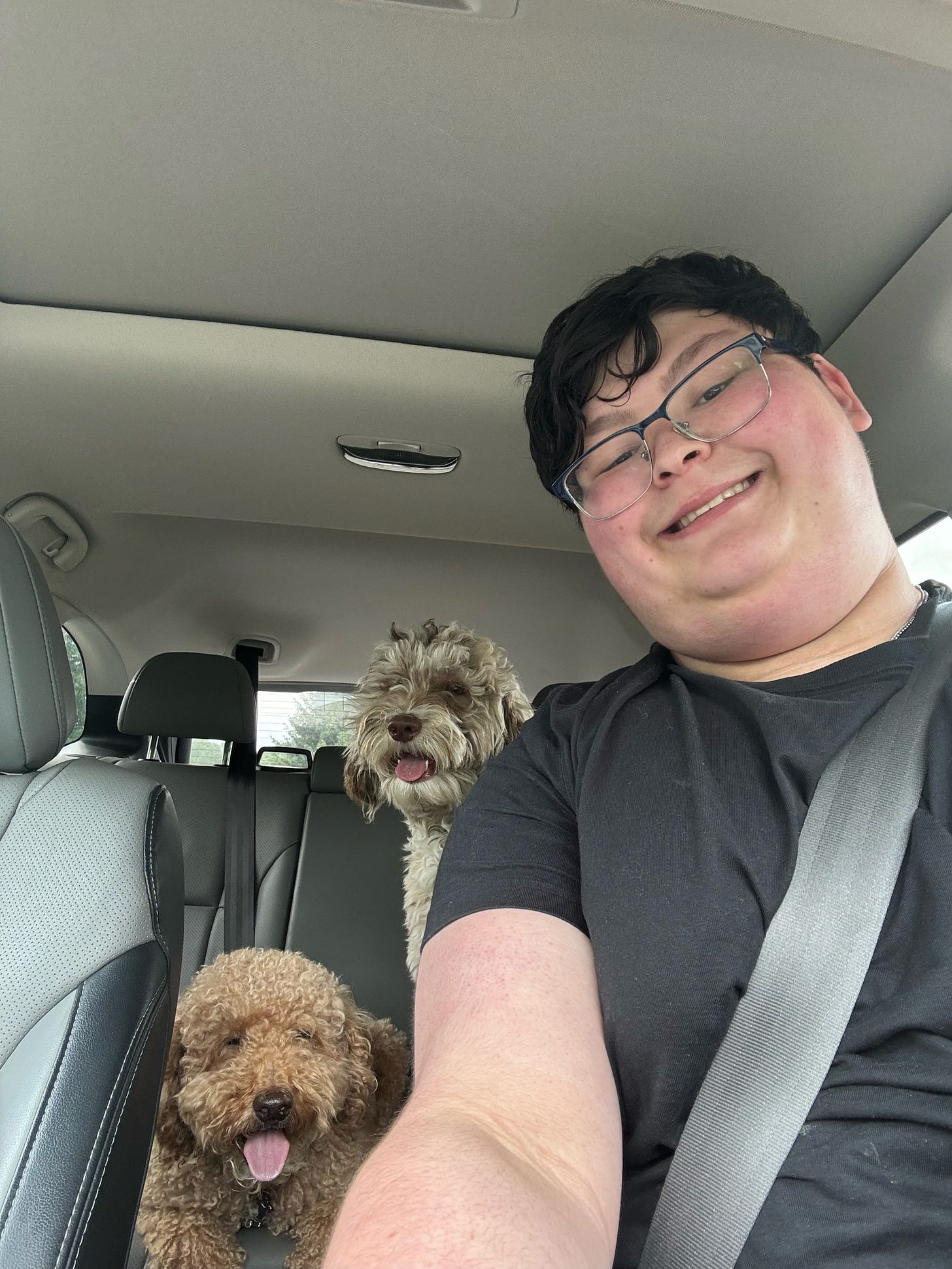At the beginning of 2024, I set two personal goals for myself: driving and college.
This first blog will focus on driving. Specifically, what is it like for me as an Autistic person? What unique challenges do I face? What kinds of accommodation and support did I need? What challenges did I encounter along the way? And in the end, why has driving been such a fulfilling experience for me?
Any driver has to learn from someone. For my first few driving experiences, I drove with my grandfather, uncle, and mom, but I knew I needed driving lessons with a professional. Our first instinct was to find a teacher who was trained to help Autistic drivers. With the help of our friend Michelle Steinhart from MATAN, we were able to find someone. Unfortunately, since this was a state-reimbursed process it was going to be long and filled with testing to determine the support I needed. The bureaucracy that these programs often pose can be challenging and that was not what I was looking for. This is a common problem for Autistics. To get the support or assistance needed we need to go through hoops and tests to prove what type of assistance we need. These barriers, both for the neurodiversity and disability community can be time-consuming, inaccessible, and delay the ability to achieve the desired goal, in this case driving.
My mom and I took a leap of faith. We contacted the All-County Drivers School (Rockland) and asked to sign up for lessons. My mom explained that I was Autistic and asked if there were any drivers with experience in regards to that. We were introduced to Richard, who understood that as an Autistic person, I communicate differently and might find certain things, like cues and signals, more challenging than other new drivers. So, we spent extra time focusing on certain cues and signals on the road, something that as an Autistic, is more difficult for me to do. He was also patient with me and provided me with the time I needed to learn and build confidence.
This experience taught me that there was no “right” instructor or approach for all Autistics. I am satisfied with how my lessons went and I am still glad we tried to contact the other instructor; it gave me insight into the challenges that I might encounter vis-a-vis accommodations.
On the road, I faced a learning curve just like other student drivers. Parallel parking, turning, and highway driving certainly took me a while. But, I think a unique challenge for me was learning to “read the road”. Social cues and hand signals are difficult for me. Road signs help because most of them are clear, and since they can be memorized, there is consistency. But, road work is challenging. The workers hold up less familiar or makeshift signs; other times, they use their hands to direct traffic. Those situations are confusing and cryptic for me to decipher. As an Autistic driver, this worries me. I already have encountered this challenge and I don’t expect it to end. I hope that in the future road workers are trained to be more uniform and clear with their directions – it is not only an issue for Autistic drivers but all drivers.
Driving has helped me with my motor skills. I have always struggled with my fine motor skills and driving requires me to use a lot of them. I think navigating the steering wheel probably took me longer than most due to my poor motor skills; but, I think a benefit of driving is it offers me consistent and regular fine motor practice. Even though I no longer take occupational therapy, driving, wrapping tefillin, and tying shoelaces are real-life ways for me to use those skills.
Driving has also provided me with unexpected sensory benefits. It is almost meditative and, when there is no traffic, like near where I live, it offers an opportunity to decompress and remove myself from any sensory challenges. Is it too cold? Warm up my seat. Too hot? AC is on. Too noisy? Pop on some white noise on the radio. Also, driving on its own is a rewarding sensory experience. I am moving my hands and feet to control the car – I can feel the engine rev under me and I can feel myself going down the road, slowly or with speed.
What do these challenges and successes indicate for other Autistics? Nothing. It indicates a lot to me, but I have noticed Autistics both embrace and abhor driving. In his book, Unmasking Autism, Dr. Devon Price gets into the reasons why he does not seek a driver's license and commutes via public transportation. Meanwhile, I hate public transportation. It is a sensory nightmare and the unpredictability and stress of ever-changing schedules is repulsive to me. So, my fellow Autistics – what has your experience been like on the road? I’d like to hear your thoughts. Please share in the comments below.
Rafi Josselson is an autistic junior at the Leffell School in Westchester County. Rafi has spoken at multiple places across the Northeast including; Solomon Schechter Day School of Bergen County, Temple Israel Center, and, the Charles E. Smith Jewish Day School. He also has written blogs for MATAN, for his own website and now for Jewish Disability Inclusion News. Rafi hopes to spread a message of Empathy, Inclusion, Awareness, and, Acceptance through his work. Outside of Autism Advocacy; Rafi is the co-president of his shul’s USY Chapter, a Hartman Teen Fellow, a counselor at Ramah Day Camp in Nyack, a section editor for his school’s newspaper, and, an avid reader of both books and the news.



